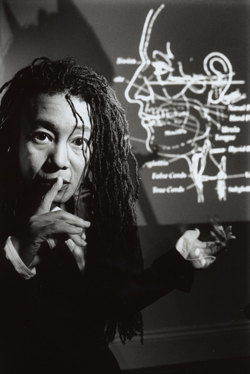Teknika Radica And UCSD Present Powering Up/Powering Down
January 13, 2004 / By Doug Ramsey
|
Pushing the boundaries of electronic media and technology, artists, writers, and musicians from around the world will gather on the University of California, San Diego campus Jan. 30, 2004 for Powering Up/Powering Down, a three-day festival of public concerts, panels, and exhibits. Powering Up/Powering Down will explore the relationship between technology, gender, race, and economics by creating a living laboratory where artists, performers, scholars, students, and the public will discuss innovative artwork, share skills and collaborate on new work. The festival will create a space for conversation and co-creation between UC campuses, underground artists from California and Tijuana, and an extended international arts community, and will spark a dialogue among international artists.
“With the ever-expanding use of technology in the arts, certain communities, including women artists and artists of color, are grossly under-represented,” says Juliana Snapper of Teknika Radica. “Recent conferences exploring issues of social identity and digital culture at MIT, USC, Duke University (and the forthcoming AfroGEEKS: From Technophobia to Technophilia in May at UC Santa Barbara), point to the need to engage in a broader conversation.” Powering Up/Powering Down will address these issues by presenting the work and ideas of exciting artists working with technology and, perhaps more importantly, creating a space for critical dialogue about the social histories embedded in our technological culture, and the power of innovating from the margins.
Powering Up/Powering Down features artists such as Los Cybrids, Miya Masaoka and Blevin Blectum of San Francisco; Mendi Obadike, and Pauline Oliveros of New York; and Sharon Daniel, Anna Everett, Adriene Jenik, George Lipsitz and George Lewis of the University of California, who use electronic media to raise questions about our interactions with technology in global culture. Powering Up/Powering Down also will spotlight innovative approaches to programming and new applications in the arts including UCSD Regents lecturer Maryanne Amacher’s Inner Ear, which creates sounds interaurally; Cristyn Magnus’ “genetically evolving” tape music; the cyborg vocals of Pamela Z, a UCSD Regents lecturer and Jaka Zelznikar’s hacker art and internet commerce-jamming.
Powering Up/Powering Down is sponsored by Teknika Radica with support from the University of California's Institute for Research in the Arts (UCIRA), UCSD’s Department of Music, UCSD’s Council of Provosts, The California Cultures in Comparative Perspectives Initiative, and the Center for Research in Computing and the Arts (CRCA). Participants include over 50 artists, musicians and writers from across the United States, Britain, Canada, Croatia, Mexico, Slovenia, and Turkey, including Ron Athey, Nao Bustamante, Monique Buzzarté, Sharon Daniel, Tirzan Evan, Leah Gilliam, The Journal of Aesthetics and Protest, Anne LeBaron, Xavier Leonard, Rachel Mayeri, Lisa Nakamura, Kristin Norderval, Talan Memmott, Pat Payne, Sara Roberts, and T. Kim-Trang Tran.
Teknika Radica is an organization of women engaging radically with technology in the arts and dedicated to building community, destabilizing hierarchies, expanding access, and facilitating new knowledge and meanings. Since the founding of the Center for Music Experiment (CME) in 1972 (the first arts research unit in the UC system), UCSD has been at the leading edge of experimentation in new media and electronic arts. Both the Department of Music and CME’s more recent incarnation, CRCA are internationally known for their experimental work in arts technologies, and have flourished through the mutual support of artists and researchers such as the KIVA group, Pauline Oliveros, Miller Puckette, MacArthur Fellow George Lewis, and many others.
For registration information and complete schedule of events and participating artists, call (858)204-8558. The conference will take place Jan. 30 – Feb 1, 2004 on the UCSD campus and at the Neuroscience Institute in La Jolla. Suggested donations are $25-65 for the conference and $10 for each concert.
For information about UCSD’s Department of Music, go to http://www.ucsd.edu/music/; UCSD’s Center for Research in Computing and the Arts, go to http://crca.ucsd.edu; Cultures in Comparative Perspectives Initiative, go to http://calcultures.ucsd.edu; or The University of California's Institute for Research in the Arts (UCIRA), go to http://ucira.arts.ucla.edu.
Media Contacts
Patricia Quill (858)822-0661 or pquill@ucsd.edu


